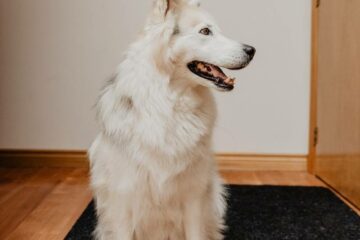Dog Barks at Microwave: Why Is My Dog Scared of the Microwave?
If your dog barks at the microwave, especially when it beeps, you’re not alone. In this article, we’ll look into why dogs might react with fear or aggression to the microwave, including going over the beeps and the other sounds that can often trigger these responses.
We’ll provide you with strategies to help your dog stay calm and quiet, including using the “Quiet” command effectively. We’ll also tackle whether the microwave’s beeps are too loud or distressing for dogs and how you can desensitize your dog to this everyday kitchen sound. Keep reading!
Dog Barks at Microwave

Your dog barks at the microwave due to the unfamiliar noises it emits and the vibrations it might cause. Dogs have sensitive hearing and can be startled or feel threatened by the electronic beeps and hums that are normal for a microwave in operation.
Why Is My Dog Barking at the Microwave?
Your dog is barking at the microwave primarily because of its strange sounds and vibrations. The beeping sound when the buttons are pressed or when the timer ends can be alarming to them. Also, the buzzing sound while it’s operating may be perceived as a threat or an intrusion in their environment.
Dog Scared of Microwave Beep
Many dogs are scared of the microwave’s beeping sound because it’s sudden and unexpected. This sound can be particularly distressing for dogs with sensitive hearing or anxiety issues. The beep, which is a normal alert for humans, can be interpreted as a danger signal by your dog.
How to Stop Dog Barking at Microwave
- Identify Triggers: Observe when your dog starts barking at the microwave. Is it when it starts, ends, or during the entire process?
- Gradual Exposure: Slowly get your dog used to the microwave’s sounds. Start by being near the microwave without turning it on and rewarding your dog for calm behavior.
- Teach the ‘Quiet’ Command: Train your dog to understand and respond to the ‘quiet’ command. When your dog barks at the microwave, say ‘quiet’ in a calm, firm voice. Once they stop barking, immediately give them a treat or praise. Be consistent and patient.
- Distract and Reward: Provide a distraction, like a favorite toy or treat, when using the microwave. This can help create a positive association with the microwave’s sounds.
- Consistency and Patience: Regular training and positive reinforcement are key. Be patient as your dog learns to adjust to the sounds of the microwave.
Dogs bark at microwaves due to their sensitivity to unusual sounds and vibrations. Understanding your dog’s perspective is important. With patience, positive reinforcement, and consistent training, including the use of the ‘quiet’ command, you can help your dog become more comfortable with the microwave’s presence and sounds.
But while these steps will help, it’s important to remember that the underlying behavioral issues (anxiety, territoriality, etc.) that were causing all of this to begin with will still be present. And until you address those, any positive changes you see will only be temporary.
“Well, how do I make these changes last?”
By getting your dog to truly choose to follow your direction, that’s how. I tried many times to write out how you can do that before deciding it made more sense to just link you to the free video series that explains it better than I’d ever be able to.
The series is by a man named Dan who is one of the world’s leading dog obedience trainers. In it, he teaches you how to put an end to things like your dog barking at the microwave and all other misbehavior using his fast and easy-to-follow methods.
In the first video, Dan will reveal to you why the two most common methods of dog training only doom you to failure. You can watch the video now by clicking here. Follow the proven system he’ll show you in his series and you’ll never have to spend another second worrying about your dog being afraid of the microwave ever again!
Why Is My Dog Scared of the Microwave?

Your dog is scared of the microwave due to its unfamiliar and sudden noises. Dogs have a heightened sense of hearing, making the microwave’s beeps and hums particularly startling or threatening to them.
Why Is My Dog Afraid of the Microwave?
Your dog is afraid of the microwave primarily because of the strange and unfamiliar sounds it makes. The beeping noise when the microwave ends or the humming sound during its operation can be alarming for them. They may have similar issues with the toaster or the oven.
Such noises can trigger your dog’s natural instinct to be cautious or defensive in the face of unfamiliar stimuli. To stop your dog barking at the microwave, learn the “quiet” command which we explain in the first section.
Are Microwave Beeps Too Loud for Dogs?
Microwave beeps, while not excessively loud to human ears, can be too loud or distressing for dogs. Their acute hearing makes them more sensitive to such electronic sounds, which might be perceived as high-pitched and alarming.
For some dogs, especially those with a nervous disposition, these sounds can cause discomfort or fear. They are generally, however, not at levels that could cause permanent hearing damage. Microwaves operate on average at levels of 55-59 decibels, with dogs being able to tolerate up to 85 decibels.
How to Desensitize Dog to Microwave Beep
Desensitizing your dog to the microwave beep involves gradual exposure and positive reinforcement. Start by standing with your dog in the kitchen while the microwave is off to create a neutral experience in that space.
Gradually introduce the sounds of the microwave at a lower volume if possible, or from a distance, rewarding calm behavior. Over time, your dog may become more accustomed to the sounds and associate them with positive experiences rather than fear.
Here’s a video you can start with containing only the sounds of the microwave operating (no beeps) so that you don’t have to constantly run your actual appliance:
In conclusion, the fear your dog exhibits towards the microwave is largely due to its unfamiliar and sudden noises. Through gradual exposure, patience, and consistent positive reinforcement, you can help your dog become more comfortable with the microwave and reduce their fear response to its sounds.
You’re probably ready to get started now that you have all of your questions about your dog barking at the microwave answered, so I’ll let you begin. Good luck, and thanks for taking a look at our article “Dog Barks at Microwave: Why Is My Dog Scared of the Microwave?”.





